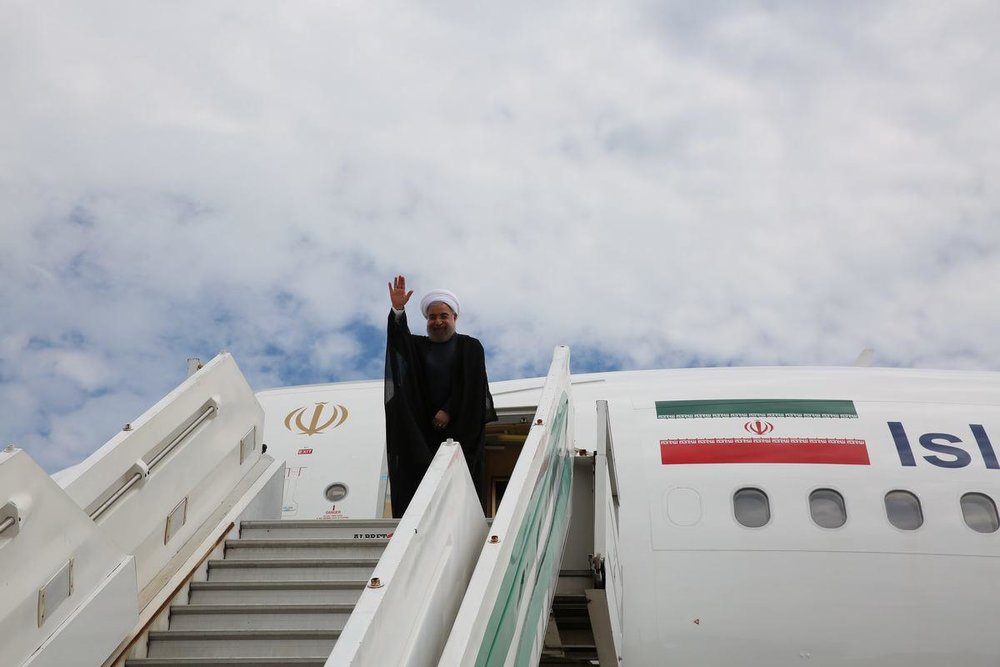Rouhani heads to Kuwait, Oman in reconciliation push

TEHRAN – Iranian President Hassan Rouhani will make formal trips to Kuwait and Oman on Wednesday, what is expected to be his first reconciliation push to fill a diplomatic gap between Iran and the Arab world.
“President Rouhani will take a one-day trip to Oman and Kuwait on Wednesday,” said an official with the presidential office on Tuesday.
Rouhani will meet Oman's Sultan Qaboos in Muscat on Wednesday before heading to Kuwait to hold talks with Emir Sheikh Sabah al-Ahmad al-Sabah, according to Iranian Ambassador to Kuwait Alireza Enayati.
The trip comes weeks after Kuwaiti Foreign Minister Sheikh Sabah Khaled al-Sabah made a rare visit to Tehran in two years to deliver a message to Rouhani on a “basis of dialogue” between Arab states and Iran.
Days following the meeting, a spokesman with Iran’s Foreign Ministry told a press conference in Tehran that the Iranian government was mulling a response to the reconciliation overture.
Also, last Wednesday Kuwaiti Deputy Foreign Minister Khaled al-Jarallah, responding to Iranian Foreign Minister Mohammad Javad Zarif's comments that his country was ready for dialogue with the GCC, said: "It's what we're looking for."
"Rouhani's regional initiative to accept invitation of leaders of Oman and Kuwait signals the need for Islamic friendship and restoration of regional ties," Hamid Aboutalebi, the Iranian president's deputy chief of staff, tweeted on Tuesday.
Less hostility between Iran and Arab states will make inroads into the beleaguered Middle East.
Efforts to restore peace to the region have failed so far.
One main cause, people familiar with the issue say, is the political standoff between Tehran and Riyadh over a list of issues.
Relations between the two have deteriorated over the past few years.
Riyadh and some other Arab countries claim that Iran interferes in Arab countries by fueling sectarianism to expand its sphere of influence in the sensitive region. Tehran denies any interference in the region.
Tensions between Saudi Arabia and Iran have particularly reached levels unseen since the 1980s, where most Arab countries took side with Iraq after it waged a war against Iran, which lasted for nearly eight years.
Irrespective of ideological discrepancies, Tehran and Saudi Arabia do not agree on the situation in Syria.
Backing President Bashar al-Assad unfailingly, Iran opposes demands by Saudi Arabia and other Arab states that Assad should step down.
Prior to the recent Astana talks on the Syrian conflict, Iranian Defense Minister Hossein Dehqan said that Riyadh should be barred from taking part in the negotiations because of its stance on a Syria without al-Assad.
On Saturday, Iran’s parliamentary National Security and Foreign Policy Committee declared that it was to review Tehran’s policies toward Saudi Arabia.
As archrivals, Tehran and Riyadh have had no political relations for a little more than a year after Riyadh summoned its diplomats from Tehran in the aftermath of attacks on its diplomatic missions in Iran by angry mobs.
The storming came after Riyadh's execution of Sheikh Nimr al-Nimr, an outspoken opponent of the Saudi kingdom.
On Jan. 17, Iranian President Hassan Rouhani said at least 10 countries had offered mediation to lessen the escalating feud.
AK/PA
